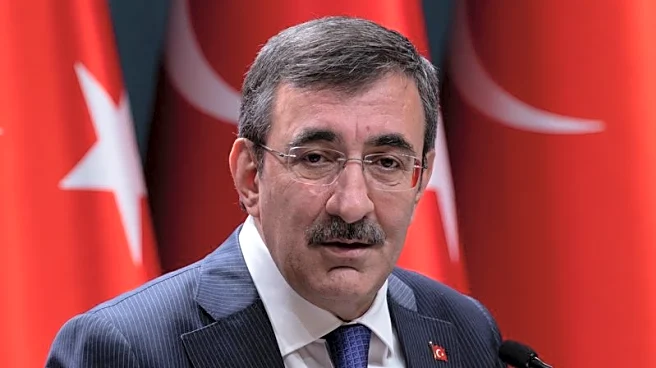What's Happening?
A United Nations assessment has revealed that the world is significantly behind on its commitments to reduce methane emissions, a potent greenhouse gas. The report, released during UN climate talks in Belém, Brazil, emphasizes the need for rapid and aggressive
action to curb emissions. Despite a pledge by approximately 160 nations to cut methane emissions by 30% from 2020 levels by 2030, progress has been slow. Methane, which has 80 times the heat-trapping power of carbon dioxide in its first 20 years, is crucial to controlling global temperature rise. The report has sparked calls for a global methane treaty, similar to the Montreal Protocol, to enforce reductions. However, some environmentalists argue that negotiating a treaty could delay immediate action needed to address emissions.
Why It's Important?
The slow progress in reducing methane emissions poses a significant threat to global climate goals. Methane is a major contributor to global warming, and its reduction is essential to prevent critical climate tipping points. The report suggests that existing policies and technologies could significantly reduce emissions, but gaps in enforcement and monitoring remain. The energy sector, particularly oil and gas, has the potential to deliver substantial reductions. However, without more stringent policies, emissions are projected to rise. The economic implications are also notable, with potential benefits from reduced emissions outweighing the costs of implementing necessary measures. The urgency of the situation is underscored by the potential to prevent crop losses and other economic damages.
What's Next?
The report indicates that fulfilling existing pledges could lead to significant reductions, but further policies are needed to contain emissions effectively. Nations are encouraged to implement maximum feasible options across energy, agriculture, and waste sectors. This includes measures like gas recovery systems at landfills and plugging abandoned wells. The estimated annual cost of these actions is $127 billion, but the benefits, including reduced warming and economic gains, are projected to be worth $330 billion annually by 2030. The report calls for immediate action to meet the pledge's goals and prevent further environmental and economic damage.
Beyond the Headlines
The debate over a global methane treaty highlights the complexities of international environmental agreements. While some advocate for binding global regulations, others emphasize the need for immediate action over lengthy negotiations. The situation reflects broader challenges in balancing environmental goals with economic impacts, particularly for industries like oil and gas. The report also underscores the importance of international cooperation, as major emitters like China, India, and Russia have not joined the pledge. The potential for significant economic benefits from reduced emissions could drive further policy changes and technological advancements.

















